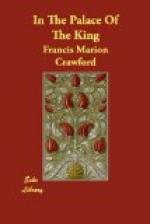With incredible calmness Philip took Mendoza’s hand as he spoke, held it for a moment in his, and pressed it almost warmly at the last words. The old man’s loyalty to his sovereign had been a devotion almost amounting to real adoration, and bitterly as he had suffered throughout the terrible interview, he well-nigh forgot every suffering as he felt the pressure of the royal fingers. In an instant he had told himself that it had all been but a play, necessary to deceive Perez, and to clear the King from suspicion before the world, and that in this sense the unbearable agony he had borne had served his sovereign. He forgot all for a moment, and bending his iron-grey head, he kissed the thin and yellow hand fervently, and looked up to Philip’s cold face and felt that there were tears of gratitude in his own eyes, of gratitude at being allowed to leave the world he hated with the certainty that his death was to serve his sovereign idol.
“I shall be faithful to your Majesty until the end,” he said simply, as the King withdrew his fingers, and he rose to his feet.
The King nodded slowly, and his stony look watched Mendoza with a sort of fixed curiosity. Even he had not known that such men lived.
“Call the guards to the door, Perez,” he said coldly. “Tell the officer to take Don Diego Mendoza to the west tower for to-night, and to treat him with every consideration.”
Perez obeyed. A detachment of halberdiers with an officer were stationed in the short, broad corridor that led to the room where Dolores was waiting. Perez gave the lieutenant his orders.
Mendoza walked backwards to the door from the King’s presence, making three low bows as he went. At the door he turned, taking no notice of the Secretary, marched out with head erect, and gave himself up to the soldiers.
* * * * *
CHAPTER XVII
The halberdiers closed round their old chief, but did not press upon him. Three went before him, three behind, and one walked on each side, and the lieutenant led the little detachment. The men were too much accustomed to seeing courtiers in the extremes of favour and disfavour to be much surprised at the arrest of Mendoza, and they felt no great sympathy for him. He had always been too rigidly exacting for their taste, and they longed for a younger commander who should devote more time to his own pleasure and less to inspecting uniforms and finding fault with details. Yet Mendoza had been a very just man, and he possessed the eminently military bearing and temper which always impose themselves on soldiers. At the present moment, too, they were more inclined to pity him than to treat him roughly, for if they did not guess what had really taken place, they were quite sure that Don John of Austria had been murdered by the King’s orders, like Don Carlos and Queen Isabel and a fair number of other unfortunate persons; and if the King had chosen Mendoza to do the deed, the soldiers thought that he was probably not meant to suffer for it in the end, and that before long he would be restored to his command. It would, therefore, be the better for them, later, if they showed him a certain deference in his misfortune. Besides, they had heard Antonio Perez tell their officer that Mendoza was to be treated with every consideration.




